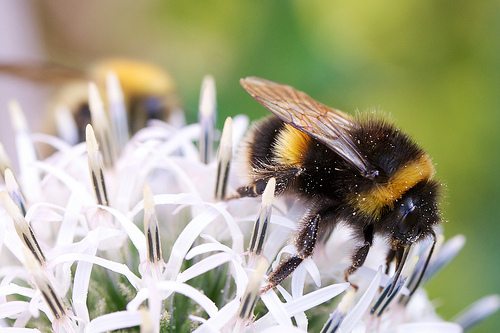

Environment
Banned pesticide interferes with bees’ ability to gather food
A new study has suggested that the pesticide imidacloprid – which is currently banned in Europe – reduces the ability of bees to collect pollen by 57%.
The study by researchers from the University of Sussex and the University of Stirling was published in the journal Ecotoxicology.
The teams weighed bees as they exited and re-entered their nests after collecting pollen and found that those that came across the pesticide failed to carry pollen or carried less than others.
Imidacloprid is a neonicotinoid pesticide that was banned in December by the European commission, along with three other chemicals, after it was linked to the decline of bee colonies in Europe.
Lead author of this latest study, Prof Dave Goulson, said, “It is unclear what will happen when the moratorium expires, as the agrochemical companies that produce them are in a legal dispute with the EU over their decision. Our new study adds to the weight of evidence for making the ban permanent.”
Goulson said that according to the study, bumblebees seem particularly affected by the chemical and that by not carrying enough pollen, the whole colony was at risk of collapsing.
Friends of the Earth’s nature campaigner Sandra Bell commented, “This new research provides further evidence that pesticides are harming bees and underlines why the temporary ban on the insecticide imidacloprid was so urgently needed.
“Bees and other pollinators play a crucial role in our food system. We cannot afford to continue bombarding them with a cocktail of toxic chemicals.
“The government’s imminent National Pollinator Strategy must tackle all the threats our bees face – including new ways to cut pesticide use.”
Further reading:
Neonicotinoid pesticides may damage human nervous system
Study: presence of bees ‘underestimated’ and improves value of crops
Bee Coalition: EU pesticide ban must be fully enforced to save pollinators
EU ban on bee-harmful pesticides to begin in December
Loss of $200bn pollinating services will be harmful, scientists warn


 Environment12 months ago
Environment12 months agoAre Polymer Banknotes: an Eco-Friendly Trend or a Groundswell?

 Features11 months ago
Features11 months agoEco-Friendly Cryptocurrencies: Sustainable Investment Choices

 Features12 months ago
Features12 months agoEco-Friendly Crypto Traders Must Find the Right Exchange

 Energy11 months ago
Energy11 months agoThe Growing Role of Solar Panels in Ireland’s Energy Future




























